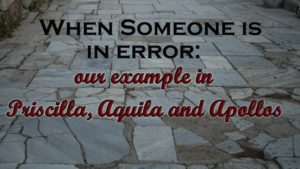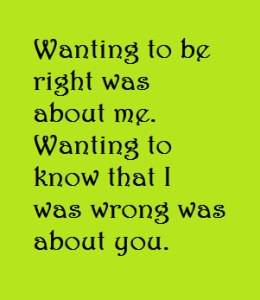When Someone is in Error: Our Example in Priscilla, Aquila, and Apollos
 I had a dream last night about the most precious saint, one trying to teach something on the internet, about the Bible, that she just didn’t understand. Her heart, however, was so right on and her fruit very good. Let me start from the beginning:
I had a dream last night about the most precious saint, one trying to teach something on the internet, about the Bible, that she just didn’t understand. Her heart, however, was so right on and her fruit very good. Let me start from the beginning:
I was on social media going over my newsfeed when this sweet little mini-teaching came to my attention:
“Shrimp isn’t food! We can’t eat shrimp! But don’t worry, there is plenty of crab to go around and it’s even better.”
Somehow, in the dream, her tone and heart came across crystal clear in the presentation. Her name was foreign, I am betting African, very exotic and beautiful to my mind, but I couldn’t have reproduced it on paper if my life depended on it. I was about to click on her name so I could gently correct her in private before the internet vultures descended to call her names and humiliate her publicly when I clicked the wrong thing, or the screen refreshed all on its own, and *poof* her post was gone and I couldn’t find her. I sat there, just sick at heart about what was about to happen to this woman with the beautiful spirit. I woke up and went to prayer about it.
I knew this woman had received an incomplete teaching herself, obviously. She certainly wasn’t wrong on purpose. I wasn’t sure if she had just seen a meme with shrimp on it, saying it wasn’t food, and took it at face value as being the only outlawed crustacean now, or if someone had seen a pic of her on social media eating it and had laid into her and really didn’t teach her, or what. What I knew was that she didn’t have all of the information she needed for understanding, and certainly not the understanding to teach. We see it all the time on social media, right? Folks lambasting people about what they are doing wrong, but not really providing a complete teaching, or even trying to impart understanding. And we certainly don’t see the social media critics sticking around to make sure people are equipped to go on with life after they receive a disembodied tidbit of information about this or that Torah Law. They are critics who go around looking to correct, not teachers looking to impart understanding. She knew that shrimp was not food. She believed it with her whole heart. She obviously didn’t even know exactly why it isn’t something that the Bible would call food. Perhaps she didn’t even understand that when the NT says the word food, that it is in an OT context, that the Bible painstakingly defines the word food, that all food has always been clean (despite the belief of the Pharisees that one could defile perfectly good food with unwashed hands), and that no additions or subtractions were made by Yeshua/Jesus in what qualifies as food, once the context of the first-century controversies is taken into account. This delightful lady wanted to obey God, n’est-ce pas? Of course! Someone convicted her of eating shrimp and she went up to the mountaintop to lovingly inform others – and make no mistake, her delivery was loving. God can do much with such a lovely heart as hers. I honestly felt very maternal feelings for her, she was so genuine.
But I lost track of her! She was about to reap a potential harvest of public correction, humiliation, name-calling, and – worst of all – she didn’t know enough to answer questions she would get from people who did not agree. Of all the things I ever learned in Church that offends me the most, it was the idea that new believers should be out preaching before they have been properly equipped. It has resulted in many precious babes landing right in the mouths of wolves who destroyed them before they even had a chance to mature. Eagerness without the knowledge to back it up isn’t so much zeal as a recipe for disaster. We have a responsibility to instruct new saints to hang back in humility while they become strong enough to be suitable guides for others.
And what about the person who “taught” her or those who were undoubtedly about to hunt her down over the coming catastrophic crab crisis? What is the responsibility now that she has it wrong? What model is provided by the Scriptures? We find it in Acts 18:
24 Now a Jew named Apollos, a native of Alexandria, came to Ephesus. He was an eloquent man, competent in the Scriptures. 25 He had been instructed in the way of the Lord. And being fervent in spirit, he spoke and taught accurately the things concerning Jesus, though he knew only the baptism of John. 26 He began to speak boldly in the synagogue, but when Priscilla and Aquila heard him, they took him aside and explained to him the way of God more accurately. (ESV)
(Just FYI, the image I used for the thumbnail is actually a marble floor from ancient Ephesus – perhaps our intrepid Bible heroes and heroine set foot upon those stones.)
“He knew only the baptism of John” – so his understanding, if anything, was merely incomplete. Like the lovely young lady in my dream. She obviously had the good fruit down, which requires the kind of knowledge that scholars cannot impart to anyone and has to instead be grown by the Holy Spirit, but her knowledge was incomplete. What did Priscilla and Aquila do? Did they interrupt the teaching, call him names, label him as a false teacher? After all, as Roman Jews, they had been recently expelled by Claudius from their home in the early 50’s and were probably in a bad mood. They knew the Scriptures and here was this young upstart with a pagan name, despite all his eloquence. He had something wrong, which obviously made him a heretic according to the by-laws of the First National Church of Facebook and its sister denomination, First Assemblies of Twitter. By those unwritten rules of conduct, they had every right to make a series of internet videos denouncing him as a moron and an idiot, calling his motivations and integrity into question, and telling everyone to listen to them instead. But what did they actually do?
“They took him aside and explained to him the way of God more accurately.” Wow, so little drama. Taking him aside meant two things – they recognized the need not only to instruct, but also to protect his honor among those whom he had been teaching. Also, they saw that his lack of knowledge was not a character flaw – someone had relayed to him an incomplete picture, and probably because they themselves had been given an incomplete understanding. It happens. At its core, this story is about treating each other like brothers and sisters, about those who actually have a MORE COMPLETE understanding stepping in to gently instruct those whose understanding is LESS COMPLETE. This is not what happens on social media, where most correction is public, brutal, and given by those who actually know very little yet look for every opportunity to look like experts by being the sheriff of that one bit of information. On social media, people treat an incomplete understanding as though it is a character flaw! As though knowledge is what we worship, instead of a relational God who is teaching and enabling us to be His image-bearers, and was even willing to send His one unique Son to die on the Cross to make it happen.
Priscilla and Aquila were Jewish believers – they grew up with the milk of Torah and evidently had the maturity to stomach the meat of the weightier matters as well. They were mature believers, eminently qualified to teach both from the standpoint of knowledge and maturity of fruit. They modeled for us the proper way to correct – not tearing one another down publicly over genuine lapses in understanding, but guarding the reputation of the one being corrected, instructing in such a way as to not become stumbling blocks to a brother whom God has called, and with the goal of having their brother be able to be more, and not less, able to minister afterward. If they had handled the situation in our modern social media way, the incident would have resulted in an angry schism within the crowd, some following after Apollos and some going after Priscilla and Aquila. Apollos, by the ancient ways of honor and shame culture, would have had to fire back insults in order to undermine their character, in an attempt to get his standing before the crowd back. Instead of building God’s Kingdom together, they would have divided it into two separate camps. We see people trying to do this very thing in I Cor 1 – but Apollos, Peter, and Paul were having none of it!
So, when we see someone in error, we have to make sure that we (1) have enough knowledge to correct, and that means we have done the hard study ourselves and haven’t just watched youtube videos or consulted Rabbi Google or Pastor Yahoo, (2) take the person aside privately and gently to better instruct them, and (3) make sure that we guard their honor jealously so that we do not create schizms or make it so that no one will want to listen to them in the areas where they are right. Doing this wrong, and unbiblically according to the New Creation model, results in damage to the Kingdom, not a strengthening of it. In the beatitudes, Yeshua preached a radical new option to the old honor/shame paradigm – one that made gentleness, mercy, peacefulness, and meekness the traits worthy of honor, as opposed to the ruthlessness required by the public battles for honor practiced by the Pharisees, Scribes, Sadducees, and the rest of the ancient world.
I am reminded that Yeshua/Jesus preached that a good shepherd will leave the ninety-nine in order to go after the one and bring it home. I find it very telling that the good shepherd does not bring the ninety-nine along as an audience in order to correct that lost one publicly. If the good shepherd is that solicitous of the needs and dignity of one lost one, how much more so should we respect a brother or sister who is simply wrong about something?

